Popular Pages
Dave started working at Alpha back in 2000 initially as a Guillotine operator working nightshifts, back when the company was based at its old site on Hixon Industrial Airfield. He began driving on an occasional basis making night deliveries when required and enjoyed the new role instantly.
As the company grew and a regular full-time delivery driver was needed, Dave jumped at the chance to make the switch and has been Alpha’s delivery driver ever since. He has delivered to Alpha customers the length and breadth of the UK in his time, using 5 different trucks over the years.
“The major difference from back when I started to now is the growth of the company, it’s really incredible to see where we are now. I started making occasional night deliveries and now there’s me working full time, plus all the external couriers who are constantly picking up from Alpha and delivering across the UK and Europe.”
Dave mcQueen – Alpha Delivery Driver
Dave is the third Alpha employee to reach the impressive 20 milestones in recent months after Ben Austin and David Williams were also recognised for their long service.
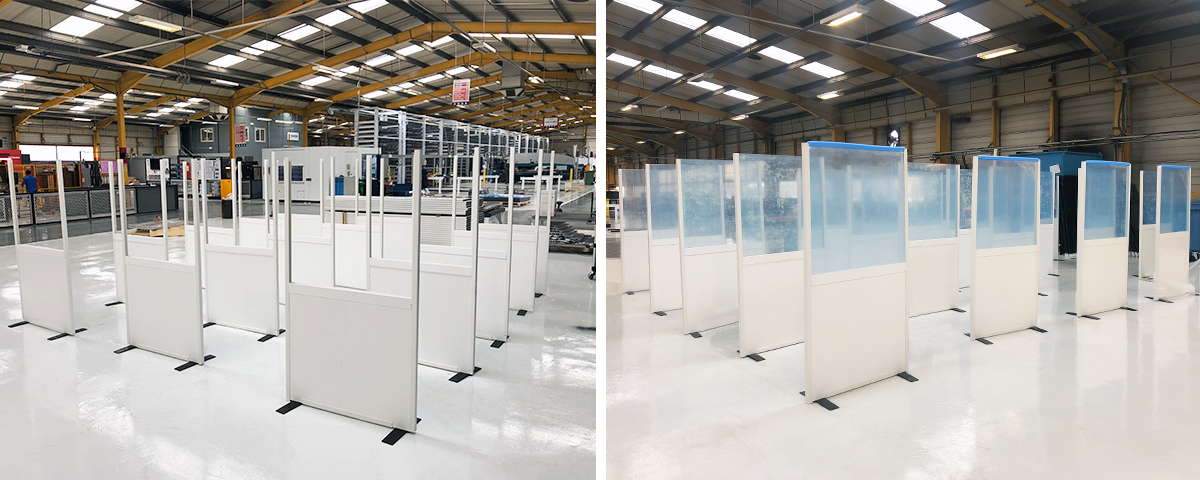
Westgate are a supplier of temporary and permanent internal hoardings and have seen unprecedented demand in recent months for social distancing screens test centre hoarding due to the COVID-19 pandemic. They had originally approached Alpha during the UK lockdown to assist in the production of their product, as businesses from all sectors across the UK began to put social distancing measures in place.
One particular enquiry came to Westgate with a large scale, urgent demand and a quick turnaround of social distancing screening. Westgate, in turn contacted Alpha again for assistance in meeting the extraordinary requirement and Alpha were keen to help. The challenge however, was that the existing methods of manufacturing the screens, particularly the box section legs, was a much longer process than was needed to meet the customer’s deadline. The original method required bespoke sized box section to be outsourced with a lengthy lead time, before the base was CNC machined and the finished leg galvanised. All time-consuming processes.
Alpha and Westgate then quickly came together to create a new, innovative solution which would allow for the same product to be manufactured in a fraction of the time. The result would be a first batch of CNC punched, laser cut, folded, welded, painted and assembled parts produced and delivered within 72 hours:
Alpha sales team receive the enquiry from Westgate for 8000 legs to be used with their Hoardfast COVID-19 social distancing screens. Their customer’s urgent demand dictates that full production will need to begin by Monday 28th in order to achieve the requirement. Alpha quickly determine that using current production methods, this will not be possible. A new solution is required.
Alpha’s head designer discusses possible solutions with Westgate’s design team. A new design of the screen leg is decided upon and Alphas design team create manufacturing drawings.
Drawings are finalised by Alpha and signed off by the customer. Parts begin to be nested by Alpha’s programming team whilst Alpha’s sales team estimate the new cost of the part.
The Alpha Sales team finalise and issue the quote to the customer for the new part. Parts are now programmed and ready for production to begin once the customer gives the green light.
The order is placed and the parts are released for production.
The Alpha production team begin the new process of manufacturing the legs for the Westgate screens.
By Sunday evening, the first batch of the COVID screen legs have been laser cut and folded.
Production continues throughout Monday with legs CNC punched, laser cut, folded, welded, painted and assembled using the new method.
The first delivery of 400 products to the new design are made to Westgate. Production will continue throughout the week with regular deliveries in batches of 400 per delivery.
Over the course of 72 hours from initial enquiry, Alpha recognised the challenges involved in the project, consulted with the customer, devised a new design and manufacturing process, estimated and nested the part and manufactured, assembled and delivered the first batch of products.
“Working with Alpha Manufacturing has been a pleasure. Their ability to pull out all stops in an unprecedented time has been outstanding. This has enabled us to meet our client’s deadlines and play our part in helping businesses deliver COVID safe environments. Their level of service from design stage to delivery has been incredible which is resulting in a longer term business partnership.“
Ben Gates – Project Manager
This project is another example of the flexible and committed approach that Alpha have to their customers, pulling out all the stops in order to help meet demand through innovative engineering solutions.
Metal working in one form or another can be traced back many centuries, with ancient jewellery cold formed from precious metals such as gold and silver. The discovery of melting metals expanded applications of metallurgy significantly and metals began to be used much more widely in the production of everyday items, particularly for military use. Metal would be heated and then hammered into flat sheets before being wrapped around wooden shields or applied to objects as armour.
The major breakthrough for sheet metal came around 1480 with the invention of the first metal rolling mill, which allowed for sheet gauge to be set using two cylindrical rollers with parallel axes to modify its thickness. Around the same time, cold machining of ductile materials was explored and by the 1600’s, machinery was capable of cutting and forming metal using animal or Hydraulic force, used for example, to form coins.
Fast forward to today and the basic principles of sheet metal fabrication have not changed. Different types of metals are rolled flat into sheets of varying thickness and used for many different purposes depending on the metal’s properties. Machinery is used to form, perforate, cut and join the sheet metal together in different sizes and shapes.
The technology used to perform these processes has obviously advanced significantly and machines are now faster, more accurate, more reliable and more efficient than ever before. It is also possible to automate and connect these machines in a way that allows for them to communicate. This is where sheet metal fabrication now begins to utilise not only technology, but other principles and practices to optimise its production.
Lean manufacturing is a methodology that focuses on minimizing waste within manufacturing systems while simultaneously maximizing productivity and uses principles such as Kaizen or continuous improvement. Waste is seen as any manufacturing process that a customer would not believe adds value and would not be willing to pay for.
Utilising the advanced technology now available within sheet metal fabrication, it is possible to design a “smart factory” reliant on automation, machine connectivity and MRP to address all of the above manufacturing wastes, creating a more optimised and cost-effective service to customers. One such example is Alpha’s large scale automated STOPA storage system which acts as a central hub, around which all manufacturing processes are linked.
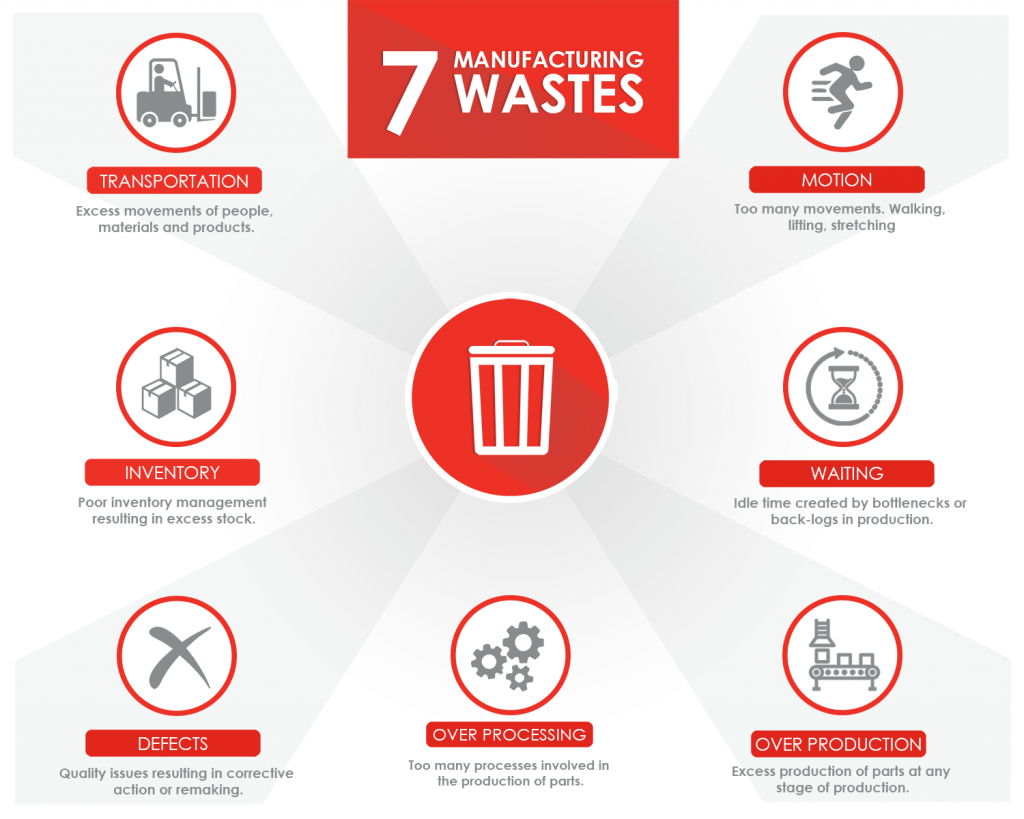
The STOPA storage system was installed as part of a strategic plan to create an optimised automated smart factory. It achieves this in 9 key areas:
As the central hub for material storage, the STOPA is able to control and maintain a steady flow of raw materials, components and work-in-progress throughout the production process. In the background, data driven automated stock management informs key departments such as procurement, material planning, production planning and production management. This eliminates inefficiencies of siloed data or communication breakdowns and creates an integrated, optimised intra-logistical environment, resulting in increased productivity.
Traditional manual storage of stock depends on pre-defined allocated spaces for different types of items, relying on manual records of each stock location to find required items. Chaotic storage allows any material to be stored in any available space within the STOPA system, almost at random. Intelligent stock management software automatically records the location of each part each time it is re-stocked, ready for the next time it’s called for. This removes the need for manual records of large inventories, eliminating potential errors which can slow down the manufacturing process as lost parts are searched for.
By integrating with the various machine softwares, the STOPA is able to communicate with each processing machine simultaneously. Delivering raw material and collecting processed parts from multiple machines continuously.
The STOPA system essentially acts as the central nervous system which connects material provisioning, material flow and processing. It automatically monitors and controls stock along this chain, creating an efficient end-to-end material flow. This improves efficiency in the manufacturing process and ultimately reduces production costs and lead times for the customer.
In total, the STOPA system runs 62 meters down the centre of the Alpha factory, with 230 pallet spaces stacked 12 high, allowing for storage of 600 tonnes of raw materials, components and work-in-progress over a relatively small footprint. By centralising this storage, space is freed up in other areas around the shopfloor, allowing for a more efficient and ergonomic factory layout.
By dramatically reducing manual movements of raw material and parts around the factory, the potential for injury is decreased. Fewer forklifts are required for the transport of items between machines thanks to automated loading and unloading, while stock is added and removed from storage via automated delivery tables. Again, this removes the need for manual handling by an operator.
Material is distributed to machines for processing as required by automated delivery tables before being placed on the machine bed by a mechanical lifting system. This reduces the time spent by an operator loading and unloading raw materials and parts, freeing them up for other value-added tasks. By removing manual handling from this process, risk of injury to operators I also significantly reduced.
The lean manufacturing model is built on waste reduction and damage to material or parts can be a major source of waste within manufacturing. Items stored in the STOPA tower system are kept in a secure central place, away from any potential damage resulting in waste. By reducing manual movements of items and relying on the more accurate automated system, the potential for damage through human error is also minimised.
By integrating directly with ERP, the STOPA becomes central to manufacturing operations, assisting the flow of information between procurement, planning and production. Alpha Manufacturing use SAGE Enterprise for MRP (material requirement planning) which controls planning, inventory and scheduling, with the STOPA an integral part of this.
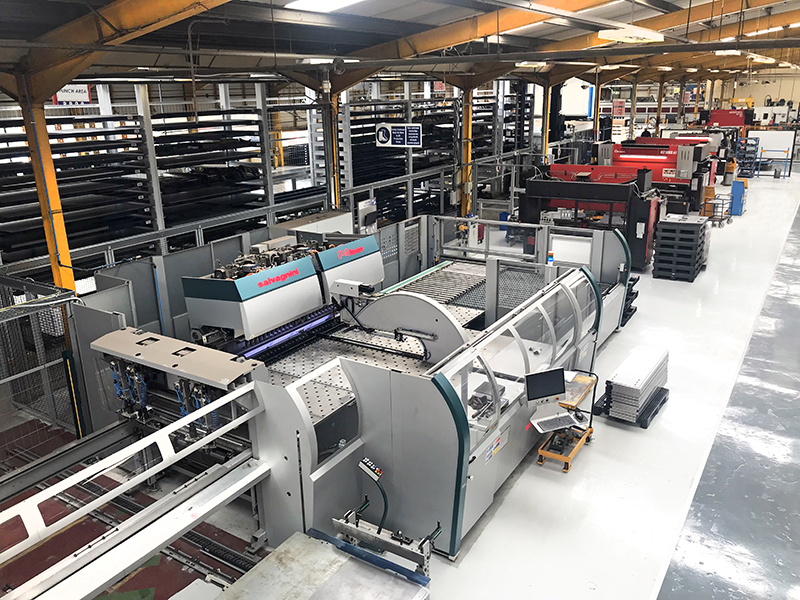
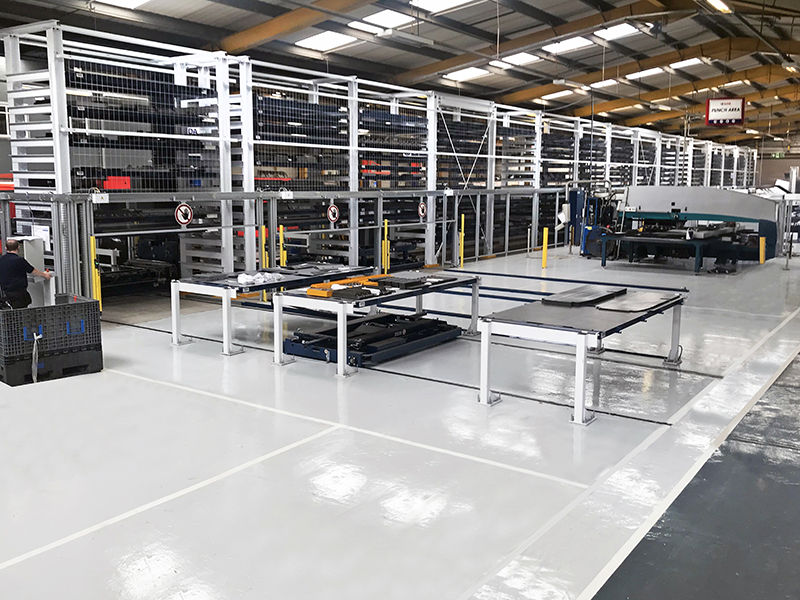
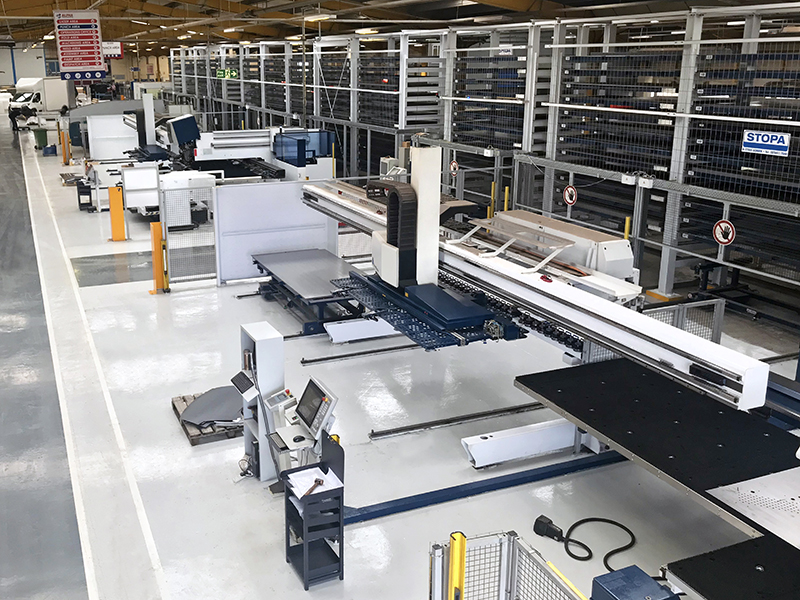
Industry 4.0 is the biggest topic of discussion at the moment not only amongst manufacturing business leaders but also those involved in supply chain and logistics.
Industry 4.0 refers to the anticipated fourth industrial revolution as a result of technological advances in areas such as wireless, device inter-connectivity, robotics, machine learning and cloud storage. The integration of these technologies into what is described as a “cyber physical system” has the potential to ultra-streamline productivity, reduce costs and optimise logistics, thereby causing a revolution in global manufacturing.
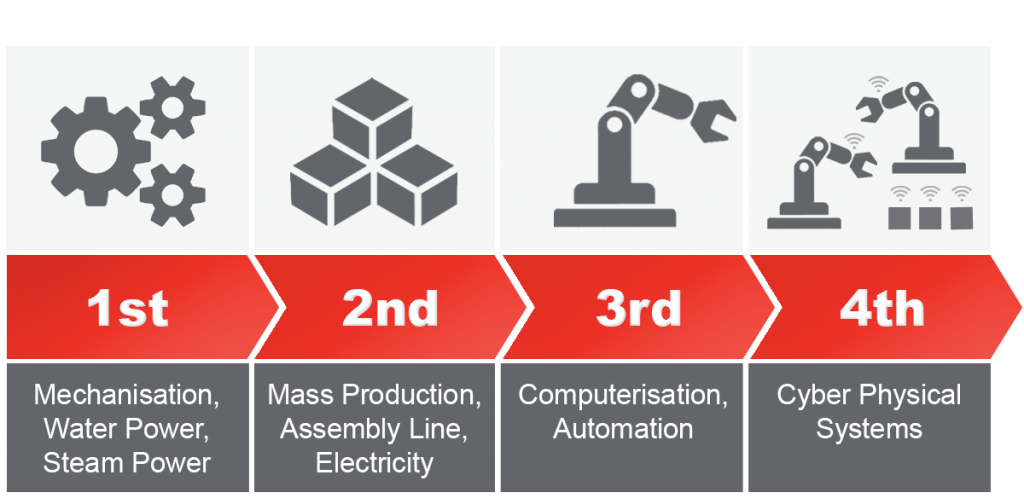


The Atlas Coating website launch follows the recent website updates of both Alpha Manufacturing and Bri-Stor Systems in recent times and mean that all three companies within the Bri-Stor Group now boast leading online platforms within their respective industries. The focus of all three websites was to offer existing and potential customers a unique resource which addresses their specific needs. The Alpha Manufacturing website became a hub of technical manufacturing knowledge and advice, whereas the Bri-Stor site was developed to improve and streamline their customer experience through a dedicated online portal.
The new Atlas site aims to simplify the powder coating process from the customer perspective with detailed powder coating FAQ’s and technical information to answer the most common customer queries. The most impressive feature of the new platform is the unique powder coating calculator, designed to simplify the process of costing any powder coating requirement. It allows customers to build an estimate for their project in under a minute, using only item dimensions, quantity and colour, which is selected at the touch of a button through a simple colour palette.
Established in 1989, Atlas have built a wealth of powder coating experience and know-how, which the new website aims to share in a simple, accessible way. Atlas are trusted by large-scale manufacturing customers of Alpha and leading UK fleet brand customers of Bri-Stor, as well as their own sub-contract customer to base, to offer the highest quality finishes to their products.
Atlas Coatings Manager Ian Buckley was delighted to see the new site go live:
“We’ve been powder coating for twenty plus years now and work with so many largescale companies from all sectors such as agriculture, retail, telecoms, construction. We powder coat components of all shapes and sizes and know the process inside out, so quality is never in doubt. What this new website gives us is the opportunity to reach a wider base of potential customers who perhaps aren’t the blue chip companies were used to but still have a sizable powder coating requirement. I think it simplifies the process of finding, costing and ordering your powder coating, particularly through the online calculator”
The Atlas Coating website and calculator are now fully live and operational, so if you have a powder coating requirement, visit http://www.atlascoating.co.uk/ today to get your free, no obligation estimate.
Alternatively, you can email enquiries@atlascoating.co.uk or call on 01889 271 002 with any queries.
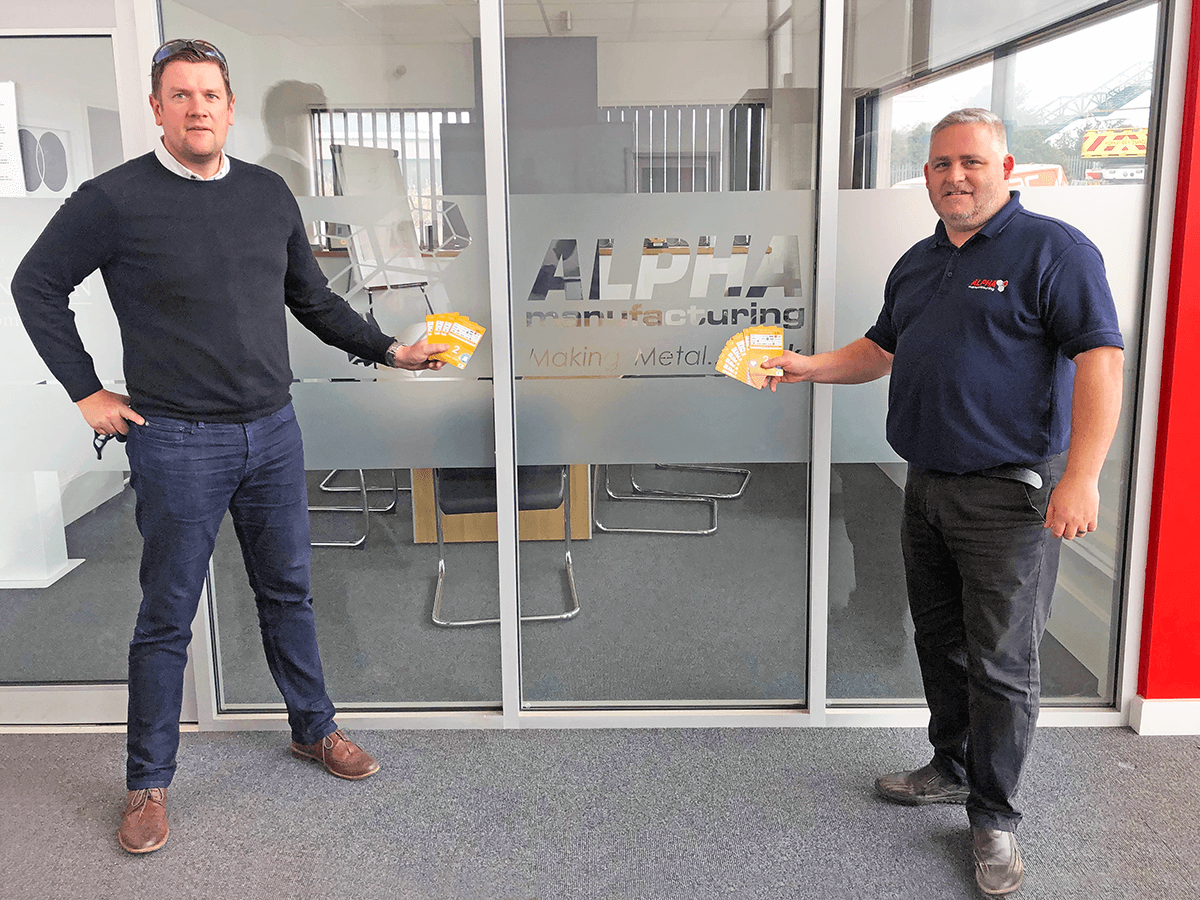
Ben joined Alpha back in 2000 as a programmer and has since gathered a wealth of experience in sheet metal fabrication, having worked in a variety of roles across the business. He quickly rose into management as Programming Manager before becoming NPI (New Product Introduction) Manager. The most recent of his roles being Quality Manager, which he became in August of this year.
His vast engineering knowledge and understanding of sheet metal programming, processes, machinery and quality makes him a truly valuable member of the Alpha team. Operations Manager Neal Lafford last week presented Ben with a gift of high street vouchers in recognition of his outstanding service over the past two decades.
“It’s with great pleasure that we can reward Ben with this gift for his long service. To have someone with such strong knowledge in our field, and also of our business is a massive benefit. Ben’s profile is testament to the way Alpha develop individuals and create a family of people heavily invested in the business to allow us to grow. With a further two long service awards to announce this month it definitely gives me confidence that we are doing things right!”
Alpha currently boasts an impressive group of veteran employees with fifteen years plus at the company, who have grown with the company as it has evolved. Alpha’s long service scheme aims to recognise and celebrate the importance of these key members who have contributed to Alpha’s evolution over the years.
Ben now takes his place in an exclusive but ever-growing club of employees with twenty years plus service. He took a moment to reflect on his time and the changes he’s seen.
“The growth of the company from where we were when I started is incredible really. We were on a different site until 2006 when we moved to our current facilities and the development in terms of capabilities and technology since then is amazing. Even after 20 years working in sheet metal fabrication, I’m still challenged every day. There’s always some kind of innovation or an engineering solution for the team to come up with. The funniest thing is that I see some of our young apprentices who are just starting out in their engineering careers, who weren’t even born when I started with Alpha!
Ben is currently focused on utilising his twenty years’ experience in his new role as Quality Manager, where he hopes to build on the good work done previously and maintain Alpha’s Quality standards across the board.

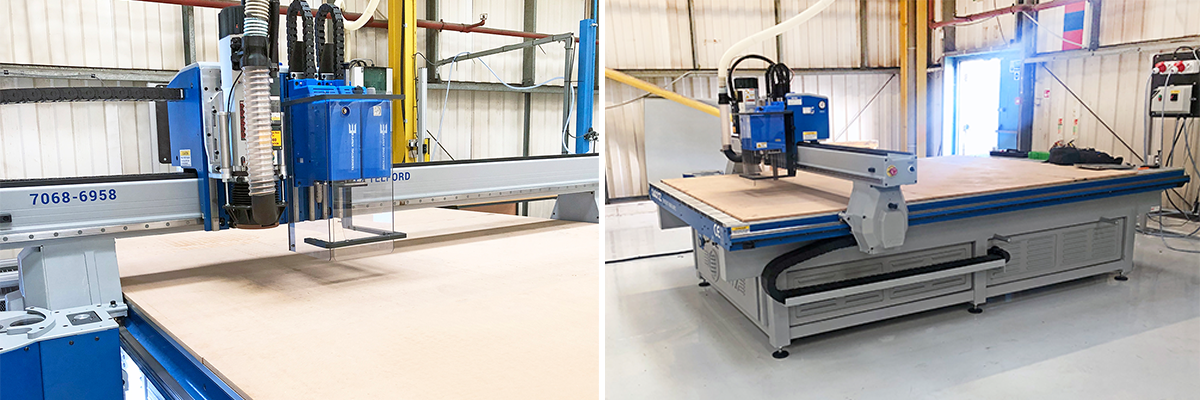
Alpha currently produce between five and six thousand tread-patterned plywood floors per year for sister company Bri-Stor Systems, which are installed in a range of commercial vehicle conversions for various UK fleets. Bri-Stor’s continued growth means increased demand for floors as well as more complex specifications. The new router offers the perfect solution to help meet this demand and open up more design options, whilst also keeping Alpha one step ahead through more flexible processes.
Currently, all floors are produced using a Bystronic 3015 laser cutting machine which is limited to flat 2D profiles. However, thanks to its 3D machining capabilities, the new router will enable Alpha to cut multiple 3D profile features such as rebates, undercuts, counter sinks and bevels in a single process. This allows for more complex designs to be achieved, with fine machine-tolerance accuracy.
Up-to four times faster than the laser cutting process, the router will massively increase capacity and production rate, whilst also being a more environmentally friendly process. In addition to wooden floors, the Trident will also allow Alpha to profile and machine other materials such as Corex or foam when required thanks to its multiple tangential knife option.
In comparison to many of Alpha ‘s recent investments, such as the Salvagnini P4 lean panel bender or the incredible STOPA automated storage system, the installation of the Trident router may seem minor. However, the benefits it will bring to Alpha and in turn, Bri-Stor Systems are no less significant. Installation is due to completed over the next week, when floor production will begin to be split between the Bystronic laser and Trident router.
The customer, who is a leading commercial server cabinet supplier, presented a commemorative sign that they had commissioned to mark the achievement and gave core members of their dedicated Alpha assembly team a small gift as a token of their appreciation for their hard work and dedication to quality.
The partnership began back in 2017 when the American based company approached Alpha to become the UK manufacturer of their product. Alpha were quick to support, investing in dedicated assembly and quality teams, while working closely with the customer to optimize the product design for manufacture. A complex contract to undertake in the outset, a huge amount of pre-production set up was required to manage the many different product variants and complex assemblies.
At the peak of production, prior to COVID-19, Alpha were producing 270 cabinets per month of varying size and complexity to be shipped direct to end users around Europe. As demand ramped up throughout the contract, Alpha were quick to invest in new automated storage systems for stock components and additional resource to ensure consistent supply.
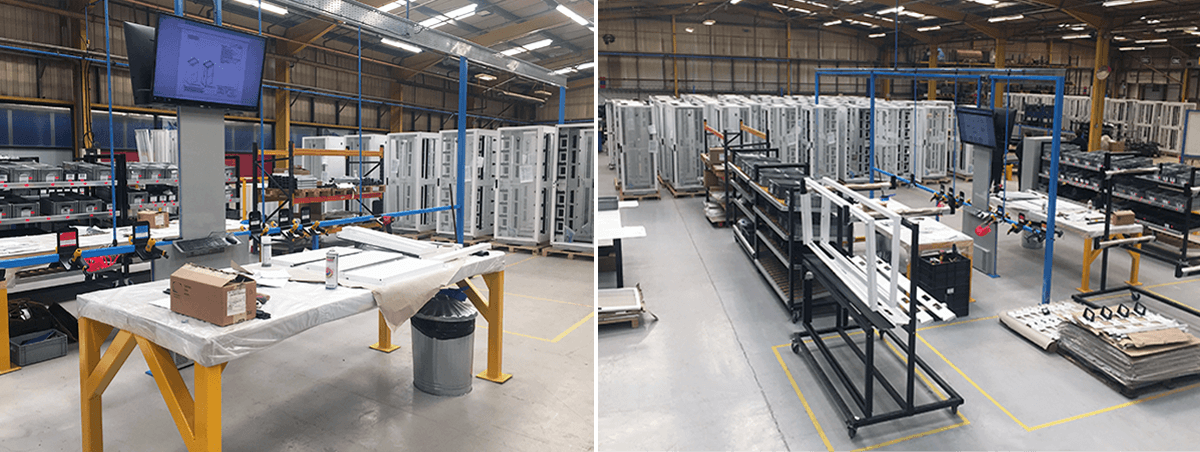
Alpha Commercial Director Robin Eley has been key to developing the relationship between Alpha and the customer over the past three years:
“We recognised that it was a massive opportunity for Alpha when the customer sent out tender documents but equally that it would be a challenging contract for us to take on. At the time, the complex nature of the product range was more involved than anything we had undertaken before. We really tackled it head on to make sure that once full-scale production was underway, we had everything already in place. As a partnership, we’ve gone from strength to strength, you’ll often find their staff working from the Alpha offices. We’ve become part of the same team essentially.”
As with all industries in 2020, both Alpha and the customer experienced major disruption during the lockdown period but early signs since the return are very positive with demand rising strongly again. This 5000-cabinet milestone is testament to Alpha’s collaborative approach and the strong relationship built between the two companies over the past 3 years.
Here’s to the next 5000 cabinets.
Back in February, Gemma was set a unique challenge, as a joint celebration of her University graduation and a fundraising activity in support of the Bri-Stor Group 2020 charity partner – Katharine House Hospice. The UNI Challenge was set; Gemma would learn how to ride the Unicycle over a three-month period, before completing a 600-meter journey through the Alpha and Bri-Stor factories.
From shaky beginnings, Gemma gradually started to master the Unicycle, practicing at home with friends over a two-month period. By late March she was nearly ready to take on the factory challenge but as the COVID-19 situation developed and the UK lock-down subsequently came into place, plans were put on hold. Following Alpha’s return to work after the lockdown, Gemma dusted off the Unicycle, re-started practicing and was soon ready to take on the challenge again.
This week, the whole of Alpha and Bri-Stor downed tools briefly to support Gemma as she glided gracefully (ish) around the gangways of the respective factories on her red unicycle. Starting at the entrance to Alpha, she travelled through the laser department, passed the CNC folding machines, through the turning & machining area, up a long ramp into Atlas Coating, past the assembly department, up another slight ramp into Bri-Stor and passed row after row of light commercial vehicle conversions, finishing, finally at Bri-Stor prototyping department – 600 meters from where she’d begun and very out of breath.
Speaking shortly after, Gemma described how she felt on completing the incredible feat.
“I was so emotional straight after; it was like a relief. Everybody followed as I went and were all at the finish line applauding and cheering. I’m really proud because at the beginning of practice I couldn’t even get on the Unicycle! Now I just want to get to my fundraising target because it’s such a good local cause. I’m really close and I’ll definitely be chasing people up for promised donations because that was really hard work.”
This is the first of many planned fundraising events that the Bri-Stor Group have been able to complete this year for Katharine House due the events of 2020 so far. However, we’re still committed to supporting the incredible work they do locally providing vital holistic care and support services for people with advanced life-limiting conditions across Staffordshire.
If you’d like to support Gemma and Katharine House, please click below to visit her JustGiving page and make a donation.
The Group recently invested in a new waste compactor into which all non-recyclable waste produced on-site is placed. This replaces the many skips that were previously located around each of the businesses, which were collected twice a week and transported to landfill sites.
Instead, the compactor waste is collected just once every two weeks and its contents converted into refuse derived fuel that can be used in place of traditional fossil fuels to produce energy. This now means that 100% of the Bri-Stor Group’s non-recyclable waste has been diverted away from landfill, while carbon dioxide emissions from waste collections has been reduced by 75%. That’s equivalent to taking 34 cars off the road in a year or planting 316 trees.
This is just one of the many steps currently being taken by Alpha Manufacturing, Bri-Stor and Atlas to minimiSe our carbon footprint across all aspects of our business.
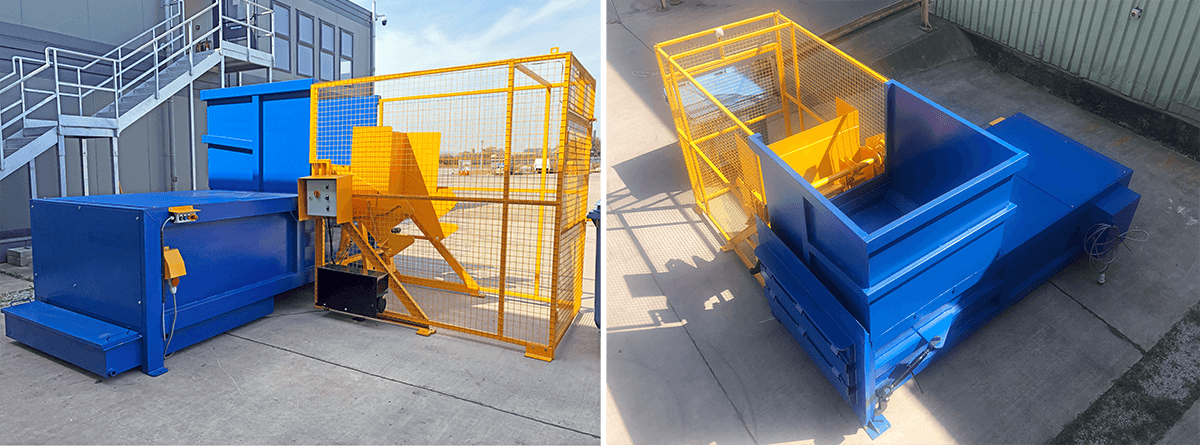
Alpha Manufacturing sister company Bri-Stor Systems are a leading commercial vehicle converter, supplying leading UK brands with their fleet vehicles. This product is fitted to many of the LCV’s that Bri-Stor produce.
An LCV rear step with tread plate pattern for extra grip. This part is profiled, punched, welded and powder coated. Alpha produce many variations of these type of steps in high volumes, both for Bri-Stor and other customers.
Previously, the profile and pattern of the tread plate step were produced by two separate processes, firstly by using a CNC Punch machine to create the tread plate pattern and then secondly by Laser Cutting the outside profile.
This sometimes resulted in misalignment issues between the two processes where the laser cut profile didn’t match perfectly with the tread patterned area. This meant that the misaligned part would need to be rejected and scrapped, with the part then reproduced using the same two processes. The issues with this are primarily high material waste and low efficiency due to the re-processing of parts.
By investing in a Trump TruMatic 6000 laser/ punch combination machine, Alpha were able to combine the two processes into one. The tread pattern and outside profile can be created simultaneously, dramatically reducing the overall processing time.
Combining these two processes using the Laser/ Punch combination machine brings many benefits to both Alpha and their customer. By removing one process completely, overall production time is significantly reduced, increasing efficiency and ultimately making the part more cost effective.
Accuracy is also improved markedly as the machine is able to auto align the laser profiling to the punched pattern as it processes, eliminating risk of reject parts and waste material. From Alpha’s perspective, this means a much more efficient and effective manufacturing process which frees up resource elsewhere and minimises the risk of re-processing parts. The overall benefit to the customer is more reliable manufacturing with no quality concerns as well as a potentially more cost-effective part.
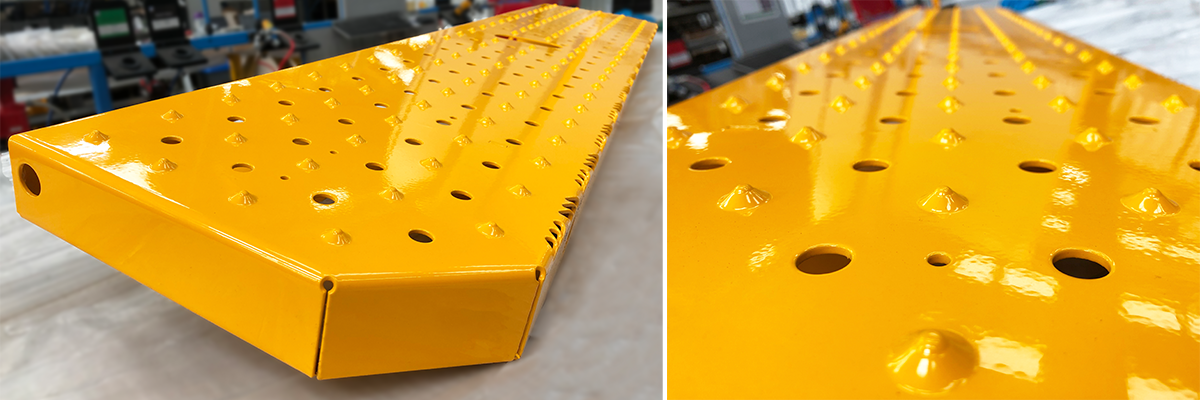
COVID-19 prevention products have been in high demand of late as the country adapts to the “new normal” and business from all sectors implement safeguarding measures. Alpha have produced various sanitisation products as well as vehicle partitions and a range of internal safety screens. These hand sanitisers had been produced for a leading UK retail display supplier who had an outsource manufacturing requirement due to the unprecedented rise in demand for sanitisation products.
With the customer’s consent, Alpha manufactured these additional units and with the help of Hex Signs and Graphics, who supplied vinyl graphics and JR Industrial who provided sanitisation liquid, donated them to Katharine House. The Stafford based hospice have been charity partners of Alpha since the beginning of 2020 and like many charitable organisations, have been heavily affected by the pandemic.
Alpha and sister company Bri-Stor Systems had planned a series of fundraising events and activities throughout the year to support Katharine House. However, the pandemic and subsequent UK lock-down, meant that many of these had to be postponed. With restrictions now easing, plans are being made to complete events such as Gemma Smith’s UNI-Cycle challenge.
The donation of these units is a small gesture but one which will hopefully help Katharine House to continue operating safely during these challenging times and to continue the valuable work they do in and around Staffordshire. Their holistic care and support services are vital for people with advanced life-limited conditions across mid-Staffordshire and they rely support of local people and businesses to operate. From the Alpha team, thanks to everyone who helped make this donation possible.
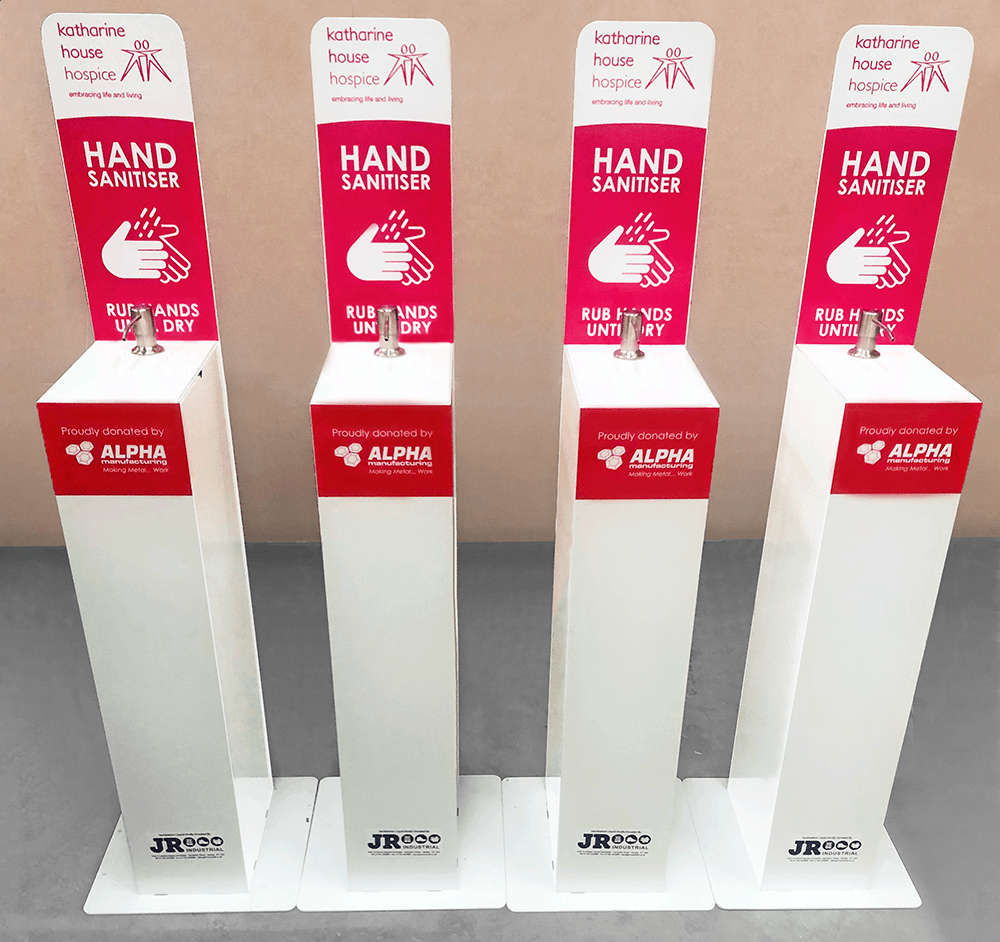
Welder-fabricator Chloe won Stoke on Trent College Apprentice of the Year in 2019 and has since been subject to widespread media attention, giving interviews to local and national newspapers, appearing on BBC Radio and attending STEM careers events such as the one held by Lincoln Electric recently.
Chloe is a passionate advocate for more women taking the Engineering career path and uses her own journey and experiences to demonstrate what girls can achieve in a traditionally male dominated industry. She is driven by a desire to break the traditional gender stereotypes, particularly in her work life. “I want to show that I can do everything a man can do… and more” Chloe has often stated.
Outside of work, she takes this one step further, by actively encouraging other like-minded young girls to take the leap into Engineering careers themselves. She offers insight, support and advice through educational and careers events and by regularly communicating her message through social media.
In this short interview Chloe discusses life since joining Alpha, the topic of Women in Engineering in general and how she hopes to make a positive impact on the subject.
The incredible car, manufactured by Ultima Sports will be delivered in three stages and this week saw the arrival of the frame, gear box, wiring loom and brake kit. Over the next eighteen months, third year Apprentices from Alpha Manufacturing and Bri-Stor Systems will come together to assemble the amazing machine under the guidance of Will.

In previous years Bri-Stor Group Apprentices have worked together to produce Caterham kit cars during a twelve-week team project. To date, three Caterhams have been produced by Bri-Stor Group Apprentices, with a day of driving them at Oulton park race track to look forward to once completed. This year, the bar has been raised for the young engineers with a much more complex and involved assembly required to produce the 800 horsepower, V8 Ultima RS.
Spending one day per week working on its construction, it’s expected that this build will take around 18 months to complete, as opposed to the 3 months required for a Caterham build. Once completed, it will be branded with livery from Bri-Stor Group graphics department Hex Signs and Graphics, just as the previous Caterham cars have been.

Group Apprenticeship Manager Will Davies-Hill explains the value of a project like this:
“Our apprentices love this project every year, it’s quite unique. They get to be hands-on, working together on something different and exciting. It gives them a break away from their usual learning whilst still allowing them to develop team-working and engineering key skills. The pride the group have on completing a project like this is incredible and it’s always a talking point across the whole business when the finished article is unveiled.”
Due to begin in October, there is already a buzz amongst Alpha and Bri-Stor Apprentices keen to get started on the project and this first delivery of parts has further added to the excitement.
First year Apprentices of both Alpha Manufacturing and Bri-Stor Systems spent the beginning of the week at Bri-Stor Group training partner JCB Academy where they completed a series of team building activities, focusing on problem solving, design & build and communication skills. During their first year, the group will spend four days per week at the Academy working on engineering principles and theory, with one day per week spent with their respective companies. During the second year, this will switch, with the majority of their time spent in the work environment and only one day per week at the Academy.
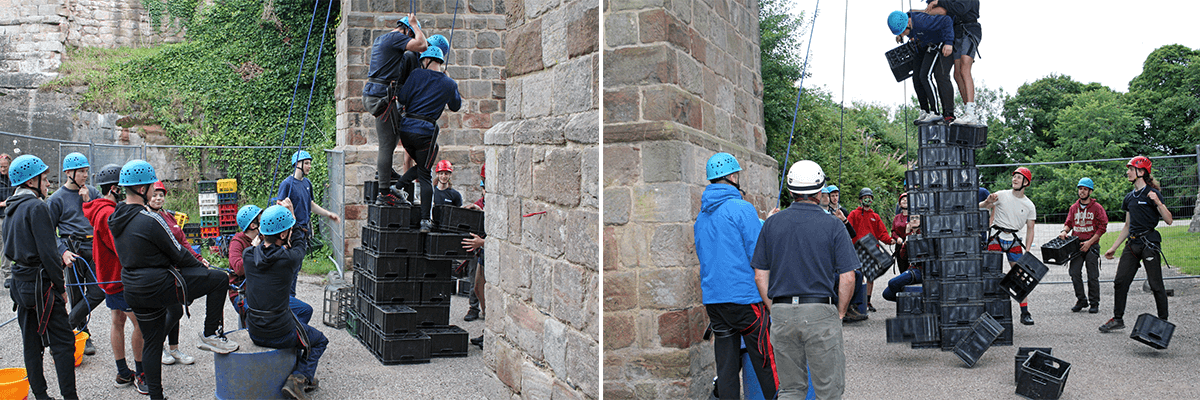
The second part of last week for the group was spent on-site settling in to their new companies, adjusting to the new surroundings and learning processes and procedures. They were introduced to their programme of study in detail for the coming year and beyond, including team projects and events such as the annual Elan Valley trip and Soap-Box Derby event. The young engineers were keen to get stuck into life with the Bri-Stor Group and were full of questions about the business as they soaked in their new surroundings.
This year, twelve apprentices were accepted across the Bri-Stor Group from over one hundred and fifty applicants from the Staffordshire area. The Bri-Stor Group apprenticeship programme grown considerably over the past 10 years to become one of the most advanced and sought-after Engineering Apprenticeships in the Midlands, with many former Apprentices now in key positions within the business.
Applications for 2021 apprenticeships will soon be open for both Alpha and Bri-Stor, check back here for further updates and information.
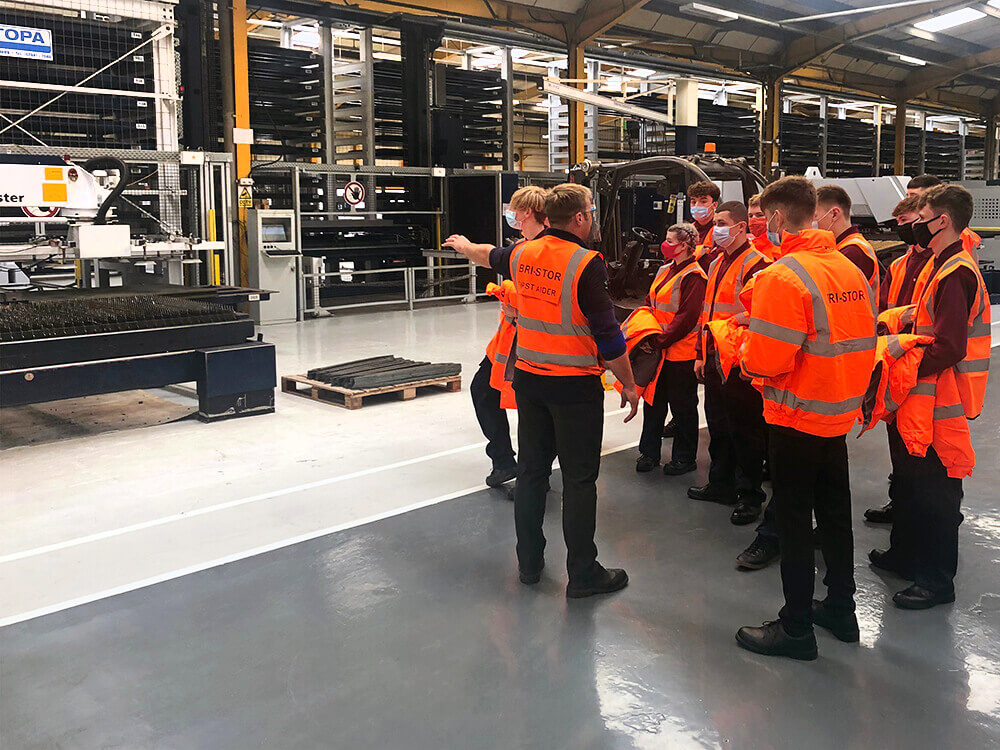
Chloe was asked to attend in order to speak to a group of secondary school girls who are interested in STEM (science, technology, engineering and mathematics) careers. She spent some time talking about her own experiences as a woman in welding, her challenges and successes, as well as her current role at Alpha Manufacturing. Alongside Chloe was Ruth Amos, Inventor and Director of the Kids Invent Stuff Youtube Channel, who also shared her inspirational story, along with some technical advice for the group.
Held at the Lincoln Electric facilities in Sheffield, the event was designed to encourage young females with an interest in STEM careers to take the step and follow in the footsteps of other inspiring female engineers. The girls were invited to try their hands at a virtual welder, with Chloe giving instruction and advice, before they had a go for real, MIG welding some small components as Chloe and Ruth talked them through the process.
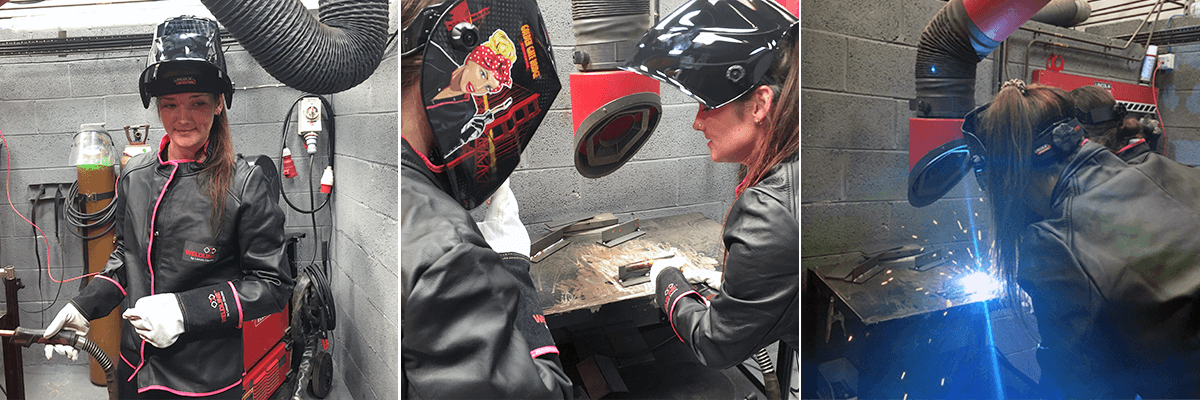
This is the latest example of Chloe’s desire to encourage other young females to follow in her footsteps and begin a career in engineering. Her determination to show that women can not only work in roles traditionally dominated by men, but can also thrive and succeed, means that she takes any opportunity to spread her positive message. Chloe was named STEM Apprentice of the Year 2019 by Stoke-on-Trent College and has since spoken extensively about women in engineering and promoting equality within STEM careers.
“No-one thinks of welding as being a woman’s job. It is seen as noisy, harsh and dangerous, and I think people were worried that I’d find it too exhausting – both physically and mentally, being a woman in a male-dominated environment.”
“I love my job because it’s different. I like doing my own thing and being in my own lane. I enjoy the variety of work and the feeling of satisfaction that I get when I’ve finished a job. It’s well paid too. I don’t have a problem with being a woman in a man’s environment.”
“Everybody told me not to do it. That’s why I go out and tell other girls not to listen to their friends or people who want to put them off. They can do it. I did. And I love it.”
Having returned to the comfort of her welding station here at Alpha, Chloe is now on the look-out for other similar opportunities to spread her inspirational message to other like-minded young females currently considering a STEM career.